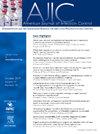感知手套应用虚拟现实教育系统对手部卫生实践的效果:随机对照试验
IF 3.8
3区 医学
Q2 INFECTIOUS DISEASES
引用次数: 0
摘要
简介:我们开发了一套虚拟现实(VR)教育系统,并评估了其在促进手部卫生实践方面的临床实用性:我们开发了一套虚拟现实(VR)教育系统,并对其在促进手部卫生实践方面的临床实用性进行了评估:这项前瞻性、为期两周的随机对照研究于 2023 年 11 月至 2024 年 1 月在日本冈山大学医院进行,共有 22 名参与者(18 名医学生和 4 名住院医师)。该研究使用了一个完全沉浸式 360° VR 系统(VIVE Pro Eye),该系统使用了头戴式显示器和传感手套,在虚拟病房中开发了三项医疗保健任务--环境清洁、纱布交换和尿液收集。在第一周监测所有参与者使用便携式擦手酒精的基线数据后,我们将他们随机分配到 1:1 组(VR 培训组和视频讲座组)。主要结果是干预前后手擦酒精使用量的差异:结果:干预前,两组的酒精使用量没有明显差异。干预后,观察到 VR 培训组的酒精使用量明显增加(中位数:8.2 克 vs. 16.2 克;P=0.019),但视频讲座组没有增加:我们的沉浸式 360° VR 教育系统增强了手部卫生实践。感染预防与控制从业人员和数字技术专家必须通力合作,共同推进优质教育设备和内容的开发。本文章由计算机程序翻译,如有差异,请以英文原文为准。
Effectiveness of sensing gloves–applied virtual reality education system on hand hygiene practice: A randomized controlled trial
Background
We developed a virtual reality (VR) education system and evaluated its clinical utility for promoting hand hygiene practices.
Methods
This prospective, 2-week, randomized controlled study conducted at Okayama University Hospital, Japan, from November 2023 to January 2024, involved 22 participants (18 medical students and 4 residents). A fully immersive 360° VR system (VIVE Pro Eye) using a head-mounted display and sensing gloves was used to develop 3 health care tasks in a virtual patient room—Environmental Cleaning, Gauze Exchange, and Urine Collection. After monitoring all participants' baseline usage data of portable hand-rubbing alcohol in the first week, we randomly assigned them into 1:1 groups (VR training and video lecture groups). The primary outcome was differences in hand-rubbed alcohol use before and after intervention.
Results
Before the intervention, alcohol use did not significantly differ between both groups. After the intervention, a significant increase in alcohol use was observed in the VR training group (median: 8.2 g vs 16.2 g; P = .019) but not in the video lecture group.
Conclusions
Our immersive 360° VR education system enhanced hand hygiene practices. Infection prevention and control practitioners and digital technology experts must collaborate to advance the development of superior educational devices and content.
求助全文
通过发布文献求助,成功后即可免费获取论文全文。
去求助
来源期刊
CiteScore
7.40
自引率
4.10%
发文量
479
审稿时长
24 days
期刊介绍:
AJIC covers key topics and issues in infection control and epidemiology. Infection control professionals, including physicians, nurses, and epidemiologists, rely on AJIC for peer-reviewed articles covering clinical topics as well as original research. As the official publication of the Association for Professionals in Infection Control and Epidemiology (APIC)

 求助内容:
求助内容: 应助结果提醒方式:
应助结果提醒方式:


